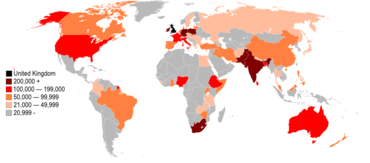Homeland insecurity
 To the young people," a security practitioner said at a recent meeting, speaking of a group he'd been working with, "it's life lived on their phone."
To the young people," a security practitioner said at a recent meeting, speaking of a group he'd been working with, "it's life lived on their phone."
He was referring to the tendency for adults to talk to kids about fake news, or sexting, or sexual abuse and recruitment, and so on as "online" dangers the adults want to protect them from. But, as this practitioner was trying to explain (and we have said here before), "online" isn't separate to them. Instead, all these issues are part of the context of pressures, relationships, economics, and competition that makes up their lives. This will become increasingly true as widely deployed sensors and hybrid cyber-physical systems and tracking become the norm.
This is a real generation gap. Older adults have taken on board each of these phenomena as we've added it into our existing understanding of the world. Watching each arrive singly over time allows the luxury of consideration and the mental space in which to plot a strategy. If you're 12, all of these things are arriving at once as pieces that are coalescing into your picture of the world. Even if you only just finally got your parents to let you have your own phone you've been watching videos on YouTube, FaceTiming your friends, and playing online games all your life.
An important part of "life lived on the phone" is in the UK's data protection bill implementation of the General Data Protection Regulation, now going through Parliament. The bill carves out some very broad exemptions. Most notably, opposed by the Open Rights Group and the3million, the bill would remove a person's rights as a data subject in the interests of "effective immigration control". In other words, under this exemption the Home Office could make decisions about where and whether you were allowed to live but never have to tell you the basis for its decisions. Having just had *another* long argument with a different company about whether or not I've ever lived in Iowa, I understand the problem of being unable to authenticate yourself because of poor-quality data.
It's easy for people to overlook laws that "only" affect immigrants, but as Gracie Mae Bradley, an advocacy and policy officer, made clear at this week's The State of Data 2018 event, hosted by Jen Persson, one of the consequences is to move the border from Britain's ports into its hospitals, schools, and banks, which are now supposed to check once a quarter that their 70 million account holders are legitimate. NHS Digital is turning over confidential patient information to help the Home Office locate and deport undocumented individuals. Britain's schools are being pushed to collect nationality. And, as Persson noted, remarkably few parents even know the National Pupil Database exists, and yet it catalogues highly detailed records of every schoolchild.
"It's obviously not limited to immigrants," Bradley said of the GDPR exemption. "There is no limit on the processes that might apply this exemption". It used to be clear when you were approaching a national border; under these circumstances the border is effectively gummed to your shoe.
The data protection bill also has the usual broad exemptions for law enforcement and national security.
Both this discussion (implicitly) and the security conversation we began with (explicitly) converged on security as a felt, emotional state. Even a British citizen living in their native country in conditions of relative safety - a rich country with good health care, stable governance, relatively little violence, mostly reasonable weather - may feel insecure if they're constantly being required to prove the legitimacy of their existence. Conversely, people may live in objectively more dangerous conditions and yet feel more secure because they know the local government is not eying them suspiciously with a view to telling them to repatriate post-haste.
Put all these things together with other trends, and you have the potential for a very high level of social insecurity that extends far outwards from the enemy class du jour, "illegal immigrants". This in itself is a damaging outcome.
And the potential for social control is enormous. Transport for London is progressively eliminating both cash and its Oyster payment cards in favor of direct payment via credit or debit card. What happens to people who one quarter fail the bank's inspection. How do they pay the bus or tube fare to get to work?
Like gender, immigration status is not the straightforward state many people think. My mother, brought to the US when she was four, often talked about the horror of discovering in her 20s that she was stateless: marrying my American father hadn't, as she imagined, automatically made her an American, and Switzerland had revoked her citizenship because she had married a foreigner. In the 1930s, she was naturalized without question. Now...?
Trying to balance conflicting securities is not new. The data protection bill-in-progress offers the opportunity to redress a serious imbalance, which Persson called, rightly, a "disconnect between policy, legislation, technological change, and people". It is, as she and others said, crucial that the balance of power that data protection represents not be determined by a relatively small, relatively homogeneous group.
Illustrations: 2008 map of nationalities of UK residents (via Wikipedia
Wendy M. Grossman is the 2013 winner of the Enigma Award. Her Web site has an extensive archive of her books, articles, and music, and an archive of earlier columns in this series. Stories about the border wars between cyberspace and real life are posted occasionally during the week at the net.wars Pinboard - or follow on Twitter.